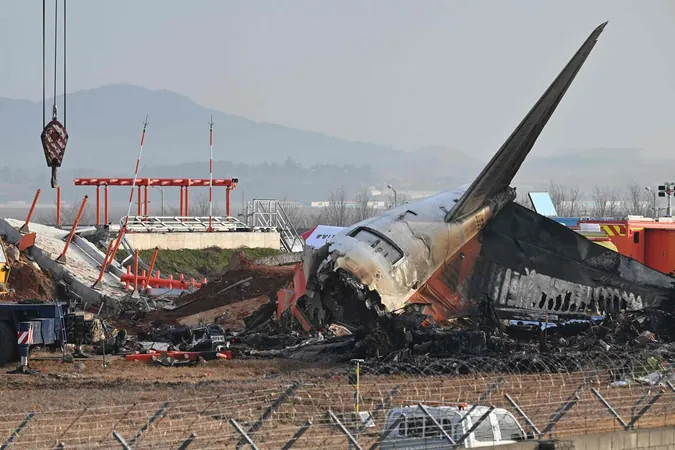
Aviation Tragedy Strikes: 2024 Marks Deadliest Year Since 2018 with Shocking Crashes!
2024-12-30
Author: Rajesh
NEW YORK – A Tragic Year for Aviation
The aviation industry is reeling from its deadliest year since 2018, driven by two catastrophic events: the Jeju Air disaster in South Korea on December 29 and the downing of an Azerbaijan Airlines plane just last week. According to recent data from Cirium, fatalities on passenger aircraft skyrocketed to 318 in 2024, making it the highest toll in six years, notably surpassing the grim statistics of 2018, a year that saw the infamous Boeing 737 Max crashes.
The year began and tragically ended with aviation incidents in Asia, with both crashes occurring during critical landing attempts—those moments often deemed the most hazardous phases of flight.
Despite overall advances in aviation safety making major fatal accidents increasingly rare, a single tragic event has the potential to significantly shift statistics, as seen this year. “The recent spike falls into the margins of unpredictability,” explained Darren Straker, a former head of air accident investigation units in the UAE and Hong Kong. He emphasized the need for enhanced training for airline crews to handle unforeseen emergencies more effectively.
Details of the Jeju Air Incident
In the Jeju Air incident, a Boeing 737-800 inexplicably failed to deploy its landing gear, skidding down the runway at Muan International Airport before colliding with a concrete wall. Of the 181 passengers aboard, only two survived as the aircraft erupted into flames. This marked Jeju Air's first fatal accident and stands as the worst in South Korea's civil aviation history.
Initial reports indicated that a bird strike prompted the mayday call from one of the pilots, leading to an attempted fly-around for a second landing. However, subsequent events raised crucial questions about why vital systems such as the landing gear and flaps were never activated. If the bird strike did indeed impair both engines, the situation could have led to severe power loss, complicating an already critical scenario.
“Cockpit alarms would have been ringing if one or both engines failed. Such a scenario can severely challenge a flight crew’s capacity to respond,” said Jeff Guzzetti, former chief of accident investigations for the FAA.
Despite the devastation, investigators are hopeful that the cockpit voice recorder and flight data device from the wreckage can provide essential insights into the flight's final moments and the actions of the pilots.
Regulatory Response and Stock Market Impact
Following the incident, South Korean regulators swiftly ordered maintenance checks on 101 other 737-800s operated by local airlines, seeking to ensure the highest safety standards in the wake of this disaster. As a result, Boeing shares plummeted by 1.8%, adding to a staggering 32% decline in the stock for 2024.
Other Aviation Incidents of 2024
January also witnessed another alarming incident when a Japan Airlines jet collided with a coast guard aircraft at Tokyo's Haneda Airport, resulting in the tragic death of five individuals aboard the smaller plane. The year further escalated in severity with more disasters, including a Nepal crash that claimed 18 lives and severe turbulence on a Singapore Airlines flight that led to a passenger's heart attack.
Geopolitical Impacts on Aviation Safety
Amidst growing global tensions, the Azerbaijan Airlines Embraer 190 experienced a harrowing end. After being diverted during a flight, it was reportedly shot down by Russian forces near Aktau, Kazakhstan. This tragedy underscored how geopolitical conflicts can have dire consequences on airline safety.
A Look Ahead and Expert Opinions
What’s particularly alarming is the sharp contrast to 2023, which was celebrated as the safest year in commercial aviation history, with not a single fatality recorded on large passenger jetliners. With decades of progress achieved in airline safety, experts urge looking at trends over long periods.
Jan-Arwed Richter, aviation safety consultant from Hamburg, expressed optimism: “I’m confident that 2024 may be regarded as an outlier in the years to come,” but it serves as a stark reminder of the unpredictability that shadows even the safest forms of transport.
As aviation officials and stakeholders grapple with these sobering incidents, the industry will undoubtedly reflect on the need for continued advancement in safety protocols and rigorous training for crews to brace against rare but catastrophic failures in the skies.


 Brasil (PT)
Brasil (PT)
 Canada (EN)
Canada (EN)
 Chile (ES)
Chile (ES)
 España (ES)
España (ES)
 France (FR)
France (FR)
 Hong Kong (EN)
Hong Kong (EN)
 Italia (IT)
Italia (IT)
 日本 (JA)
日本 (JA)
 Magyarország (HU)
Magyarország (HU)
 Norge (NO)
Norge (NO)
 Polska (PL)
Polska (PL)
 Schweiz (DE)
Schweiz (DE)
 Singapore (EN)
Singapore (EN)
 Sverige (SV)
Sverige (SV)
 Suomi (FI)
Suomi (FI)
 Türkiye (TR)
Türkiye (TR)